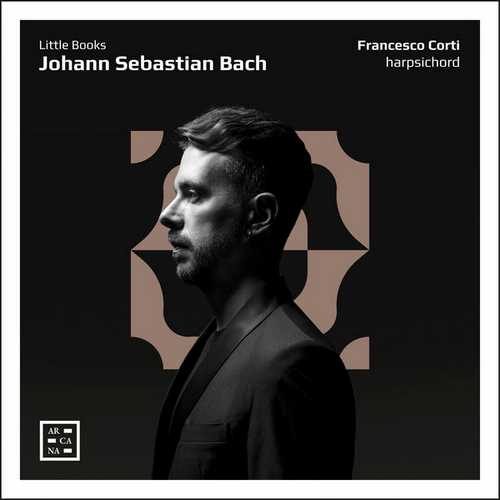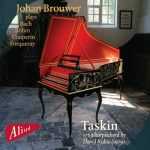
Composer: Johann Sebastian Bach, Georg Böhm, François Couperin, Johann Adolph Hasse, Johann Kuhnau, Georg Philipp Telemann
Performer: Francesco Corti
Format: FLAC (tracks)
Label: Arcana
Release: 2020
Size: 1.74 GB
Recovery: +3%
Scan: yes
01. Bach: Praeludium, BWV 815a (Attributed to Johann Sebastian Bach)
Bach: French Suite in E-Flat Major, BWV 815
02. I. Allemande
03. II. Courante
04. III. Sarabande
05. IV. Gavotte
06. V. Air
07. VI. Gigue
Kuhnau: Suonata Quarta in C Minor
08. I. Il lamento di Hiskia per la morte annonciatagli e le sue preghiere ardenti
09. II. La di lui confidenza in Iddio
10. III. L’allegrezza del Re convalescente
11. Hasse: Polonaise in G Major (BWV Anh. 130)
12. Böhm: Praeludium, Fugue and Postludium in G Minor
Bach: Praeludium, Fugue and Allegro in E-Flat Major, BWV 998
13. I. Praeludium
14. II. Fugue
15. III. Allegro
16. Couperin: Rondeau in B-Flat Major (BWV Anh. 183)
Telemann: Ouverture in E-Flat Major, TWV 55:Es4
17. I. Ouverture – Entrée (Arr. for Keyboard)
18. II. Menuet I – II (Arr. for Keyboard)
19. III. Loure – Gigue (Arr. for Keyboard)
20. IV. Bourrée I – II – Polonaise (Arr. for Keyboard)
21. V. Aria (Arr. for Keyboard)
22. VI. Passepied I – II (Arr. for Keyboard)
Bach: Capriccio sopra la lontananza del suo fratello dilettissimo, BWV992
23. I. Arioso. Adagio. Ist eine Schmeichelung der Freunde, um denselben von seiner Reise abzuhalten.
24. II. Ist ein Vorstellung unterschiedlicher Casum, die ihm der Fremde könnten vorfallen.
25. III. Adagiosissimo. Ist ein allgemeines Lamento der Freunde.
26. IV. Allhier kommen die Freunde, weil sie doch sehen, dass es andres nicht kann sein, und nehmen Abschied.
27. V. Aria di Postiglione. Allegro poco.
28. VI. Fuga all’imitazione di Posta.
29. Bach: Chorale Prelude BWV691 ‘Wer nun den lieben Gott lässt walten’
Little by little, Francesco Corti begins to stand out with his colourful personality. In some respects, he reminds us of Ottavio Dantone and his vivid, overflowing imagination. Here, the masterful blend of rigour and fantasy is striking. And what a copious program – over 80 minutes long!
The Praeludium BWV 815a is the ideal entry point before a French Suite in E Flat major (No. 4) by J. S. Bach (here the 1722 version, which never appears constrained by its structure). Have we ever heard such natural polyphony, beautifully deployed harmonies and rhythmic diversity? In fact we have, with pianist Tatiana Nikolayeva in a 1987 concert in Salzburg (Orfeo).
Then come the (re)discoveries. If Leonhardt had once shown (Teldec) the beauty of Kuhnau’s biblical sonatas, Francesco Corti gives Il lamento di Hiskia an unexpected depth. It takes on a truly transitional form between the French Tombeaux and the denser recitatives of Bach’s Passions, whereas L’allegrezza del Re directly evokes France. After a short and unremarkable Hasse passage, Francesco Corti throws himself into Praeludium, Fugue & Postludium in G minor by Georg Böhm, which is perhaps even more poetic than its twin, Praeludium, Fugue et Allegro in E flat major by J. S. Bach (BWV 998) which the harpsichordist performs in an unrushed and improvisational manner, a performance style which can also be found in Capriccio Sopra’s overture lontananza del fratello dilettissimo BWV 992.
Ken Yoshida captures a wonderful recording of the sublime Andrea Restelli harpsichord which is modelled on a 1738 Christian Valer preserved at Nuremberg, played by one of the most intense artists on the young Baroque scene. Discover this recital in all its glory, it is certainly worth the listen.



